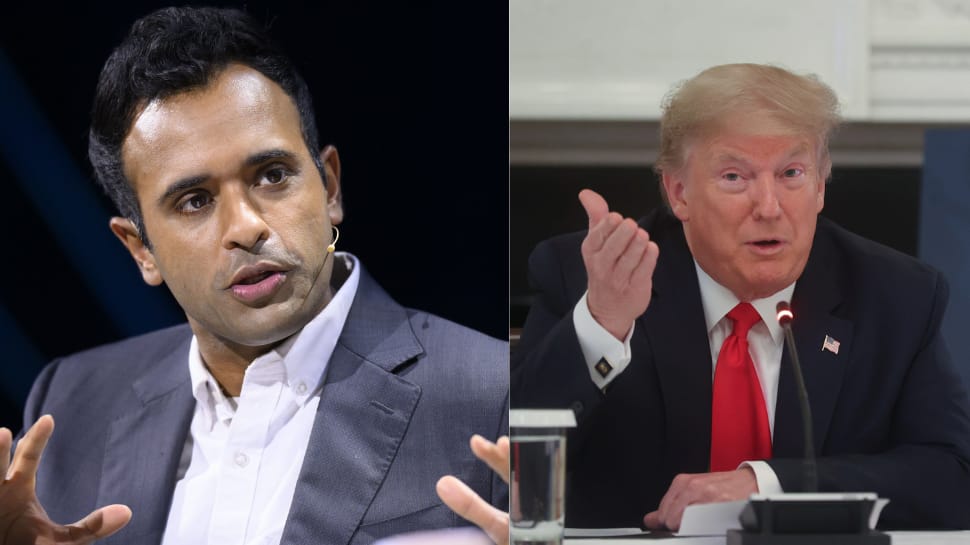 |
|
Vivek Ramaswamy, a prominent figure in the contemporary conservative movement, is poised to potentially shift his focus from national politics to the Ohio gubernatorial race. This move follows his involvement in the Department of Government Efficiency (DOGE), a key initiative within the Trump administration’s vision for streamlined and modernized federal operations. The article highlights Ramaswamy’s background as a successful biotech entrepreneur and bestselling author, emphasizing his outspoken criticisms of 'woke' culture and established institutions. His public persona is crafted around a blend of entrepreneurial success, political commentary, and a strong conservative ideology, making him a compelling figure within the Republican party and a subject of ongoing media attention.
Ramaswamy's journey to potential gubernatorial candidacy is deeply intertwined with his participation in the 2024 Republican presidential primaries. His campaign, while ultimately unsuccessful, showcased his 'America First 2.0' platform, characterized by promises to reform federal bureaucracy, prioritize educational reform, and implement technological advancements in government. Although he secured a loyal following among conservative voters, his campaign's impact is best summarized by his fourth-place finish in the Iowa caucuses. While his presidential aspirations were thwarted, his involvement in DOGE under Trump provides a compelling narrative for his potential move to state-level politics. This strategic shift aligns with the evolving political landscape in Ohio, especially considering the recent appointment of Lieutenant Governor Jon Husted to the U.S. Senate, thereby creating a vacancy and opportunity for a new gubernatorial candidate.
The Department of Government Efficiency (DOGE) under Trump's second-term vision represents a significant undertaking aiming to fundamentally reshape the efficiency and effectiveness of the federal government. Ramaswamy's collaboration with Elon Musk within this department brings together two influential figures from the private sector, both known for their innovative approaches and willingness to challenge conventional practices. The department's work, which includes auditing agencies like the Treasury, IRS, and Health and Human Services, is generating significant attention and debate. Ramaswamy's advocacy for leveraging artificial intelligence to improve government processes is a particularly notable aspect of his contributions. This focus on technological solutions is a hallmark of his approach, but simultaneously, it highlights a key source of criticism surrounding his efforts. Skeptics question the feasibility of implementing such ambitious technological reforms within the complex structure of the federal government.
The article presents a relatively concise overview of Ramaswamy's life and career, focusing largely on his recent political activities. It lacks deep dives into his specific policy proposals or his detailed biography. However, the overall portrait portrays him as an ambitious and outspoken conservative figure who is comfortable operating in both the private and public sectors. His potential gubernatorial candidacy, if realized, would likely serve as a significant test of his ability to translate his national profile and conservative ideology into tangible success at the state level. The implications of his move, both politically and in terms of his future ambitions, are far-reaching and warrant continued observation. The success or failure of his potential gubernatorial run will provide important insights into the current state of Republican politics, the reception of his brand of populism, and the limits of applying private-sector management strategies to the public sector.
Further analysis requires considering the broader political landscape in Ohio. The state's electorate presents a complex mix of urban and rural areas, with varying levels of support for the Republican party. Ramaswamy's ability to successfully navigate this diversity, connect with voters, and articulate a compelling vision for the state will be pivotal to his success. His past criticisms of established institutions, his focus on technological solutions, and his association with the Trump administration will all play significant roles in determining voter sentiment towards his candidacy. The ongoing narrative surrounding Ramaswamy is not only a story of individual ambition but also a window into the evolving dynamics of the Republican party and the broader political climate of the United States.
Source: Who Is Vivek Ramaswamy? Meet Biotech Entrepreneur Playing Crucial Role In Trump 2.0
